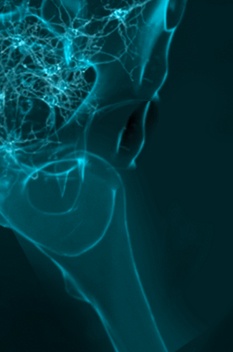Introduction
Peripheral nerve tumors can occur anywhere in the body. Most of them aren't cancerous ...
This procedure enables microscopic and thus nerve-sparing surgery of the pelvic nerves. Special, high-resolution video cameras have been developed for such laparoscopic procedures, which allow a high degree of magnification. Thanks to this development, all pelvic nerves can now be reached laparoscopically. Laparoscopy provides outstanding diagnostic services as well as surgical treatment of the pelvic nerves, in which, in addition to the cameras, the finest microsurgical instruments are utilized. These nerve-saving surgical techniques were developed with the aim of preserving the functions of the bladder and bowel as well as the sexual organs.
A new treatment method for patients with pelvic neuralgia
Neurosurgical interventions for the treatment of nerve disorders resulting from constriction or damage to the nerves outside the brain and spinal cord, can now be performed safely and effectively using laparoscopy. In patients suffering from neuropathic pelvic pain, nerve decompression (pressure relief), neurolysis (relief of the nerve sheath) and nerve reconstruction are the most common treatment methods. The laparoscopic approach makes it possible to diagnose and treat the causes at the same time.
With the advanced endoscopic and microsurgical instruments, all areas of the retroperitoneal space of the pelvic cavity, i.e. those anatomical structures that lie behind the peritoneum, can be very easily reached and made visible. The strong visual magnification allows precise and minimally invasive operations on the sensitive pelvic nerves.
Laparoscopic, neuropelveological treatments should only be performed by surgeons who have experience with laparoscopic surgery in the retroperitoneal space of the pelvic cavity. The diagnosis of pelvic nerve damage by survey and clinical examination (neuropelveological diagnosis), on the other hand, can be performed by any appropriately trained physician.
The pelvic nerves as the cause of chronic pelvic pain
For many conditions, a neurological approach is essential to find their true cause. The assumption that the point of pain is also the place where the cause of the pain is to be found is not accurate. This is especially true for different types of chronic pelvic pain (Chronic Pelvic Pain, CPP). The true causes of such pain syndromes can include conditions such as endometriosis, disease of the Pudendal nerve, infections, anal fissures or spinal cord damage.
In the case of disorders or damage to the pelvic nerves, the patient's pain points and the sensorimotor dysfunctions of the pelvic organs and lower extremities indicate which nerves are involved in the pain process. However, the actual cause is usually located on the way from the pain site to the brain. The neuropelveological approach aims to determine exactly which nerves are responsible for the pain and at which level. Modern laparoscopy enables a reliable diagnosis to be made.
The occurrence and frequency of pelvic nerve damage are still greatly underestimated. When diagnosing chronic pelvic pain, damage to the pelvic nerves is often not taken into consideration.
A groundbreaking technique: The LION procedure
Laparoscopy is the only technique that allows the selective placement of electrodes on all pelvic nerves and pelvic nerve plexuses. With the so-called LION procedure (Laparoscopic Implantation of Neuroprothesis / LION procedure), the electrodes can be placed in direct contact with the nerves, with precise visualization of the relevant nerves and their immediate surrounding. The LION method, applied to the pelvic nerves, uses electrical nerve stimulation to control pain symptoms with neurogenic causes. In addition, the procedure is an effective therapeutic measure for malfunctions of the pelvic organs. The LION procedure has also proven to be a revolutionary treatment method in the treatment of patients with paraplegia.
To help people in difficult situations to improve their quality of life has become his life's passion. Continuous research, decades of clinical experience and the focused determination to find a solution for previously unsolved medical problems, have enabled Prof. Possover to help often quite discouraged patients find release from their seemingly insurmountable problems.
Our team will take care of you
We will dedicate our expertise and know-how to help you find the solution that is right for you.
„As a cheerful, open and communicative person, I really appreciate coming into contact with people from all over the world. The well-being of others is very important to me.“

Neuropelveology is a medical discipline developed by Prof. Possover. It is based on the discovery of the pelvic nerves and includes the diagnosis of the diseases of these nerves by means of gynaecological examination methods and their treatment by means of laparoscopy.
Read morePeripheral nerve tumors can occur anywhere in the body. Most of them aren't cancerous ...
Vulvodynia is a chronic pain syndrome affecting respectively the vulva and occurs ...
Klausstrasse 4
CH - 8008 Zürich
Switzerland
E-Mail: mail@possover.com
Tel.: +41 44 520 36 00